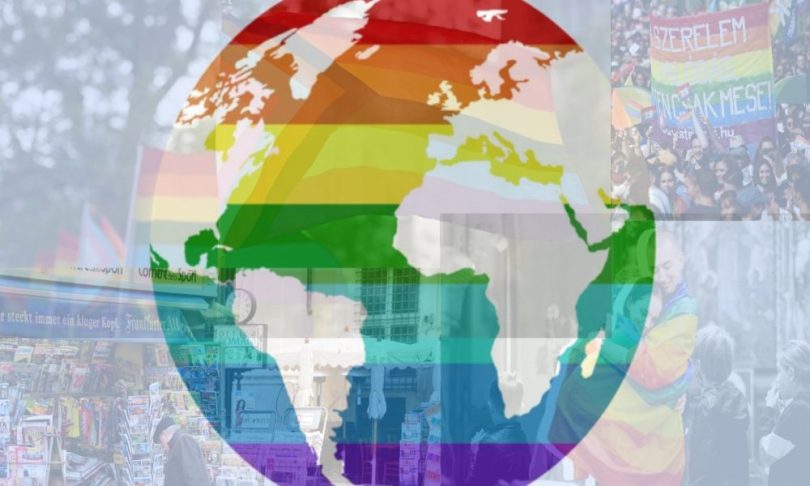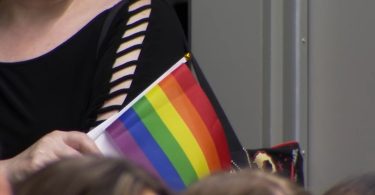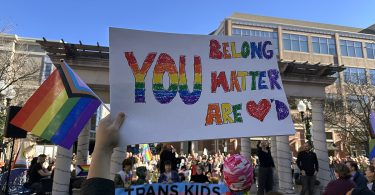MOSCOW, Russia – The Russian Federal Service for Supervision of Communications, Information Technology and Mass Media agency, abbreviated as Roskomnadzor, has launched an investigation into the language learning app Duolingo for allegedly spreading “LGBTQ propaganda.”
The popular learning app teaches over 40 languages to more than 60 million users worldwide.
Russian media news outlet Novaya Gazeta reported that a complaint, filed by a group Radetel, based in Novosibirsk in central Russia, and claims on its social media and website that it is on a mission to protect “public morality, culture, and traditional values,” accused the learning app of violations of Article 5 the Russian “on the protection of children from information harmful to their health and development” law which specifies the promotion of “non-traditional sexual relations as detrimental to children’s health and development.”
Russian state media outlet TASS reported that Roskomnadzor confirmed that the agancy would be investigating Duolingo for potential “distribution of information that promotes LGBTQ.”
For its part as defined on its website, Duolingo states: “Duolingo believes deeply in diversity and representation. This made it a no-brainer to include all types of characters of different ages, ethnic backgrounds, and sexual orientations.”
The app’s statement goes on reading:
“The second reason is our learners. Something really unique about Duolingo is the extremely vast and diverse audience for our content: language learners of all ages, from all around the world. Yes, that’s a lot of people. And with such a broad base of learners, we have a responsibility to reflect and relate to the experiences of all kinds of people, LGBTQIA+ folks included.
Of course, characters are also much more compelling when they’re relatable, not only because of their dreams and their flaws but also who they love. So when we create Stories, which are written first in English and then adapted to other languages, we aim to make our content entertaining and relatable for learners worldwide. This is a fun and oftentimes difficult challenge. We’re proud to have our characters, especially our LGBTQ characters, help us do that.”
Radetel, which referred to members of the LGBTQ community as “sodomites” in its complaint to Roskomnadzor, said that “outraged” parents had brought Duolingo’s LGBTQ “propaganda” to its attention, adding that they had said they didn’t know how to explain the sentences to their primary school-age children “without traumatizing them,” Novaya Gazeta reported.
BERLIN, Germany (Human Rights Watch) – Russian courts have issued the first known extremism convictions arising from the 2023 Supreme Court ruling designating the “international LGBT movement” as extremist, Human Rights Watch said today. The Supreme Court ruling, which was handed down on November 30 but became public only in mid-January 2024, indicates that many more convictions may follow.
The Supreme Court ruling also declared the rainbow flag a forbidden symbol of the “LGBT movement.” Displaying the flag is the basis for administrative penalties in at least three cases that courts have tried in recent weeks. In late January, a court in Nizhny Novgorod sentenced a woman to five days detention for wearing rainbow-colored earrings after an individual accosted her and her friend in a cafe. Also in late January, a judge in Volgograd region handed down a fine over a rainbow flag published on a social media page. In early February, a court in Saratov fined a woman for posting a rainbow flag on social media.
“The Supreme Court decision opened the floodgates to allow arbitrary prosecution of lesbian, gay, bisexual, transgender, and queer people, along with anyone who defends their rights or expresses solidarity with them,” said Tanya Lokshina, associate Europe and Central Asia director at Human Rights Watch. “For years, Russian authorities tried to erase LGBT visibility, and now they have criminalized it.”
At least three groups supporting LGBT rights have shut down their operations for fear of prosecution. Other consequences of the ruling have included a series of police raids of gay clubs, incidents of self-censorship, and an uptick in requests for legal advice from remaining LGBT support groups, which have now turned to working clandestinely.
The Supreme Court ruling and prosecutions flowing from it are discriminatory, violate a wide range of rights, and should be overturned, Human Rights Watch said.
Under Russian criminal law, a person found guilty of displaying extremist group symbols faces up to 15 days in detention for the first offense and up to four years in prison for a repeat offense. Participating in or financing an extremist organization is punishable by up to 12 years in prison. The authorities may include individuals suspected of involvement with an extremist organization in the countrywide “list of extremists” and freeze their bank accounts. People deemed to be involved with an extremist organization are barred from running for public office. Draft legislation further expanding the notion of “justifying extremism” has passed first reading in Russia’s parliament.
The Supreme Court’s perverse decision to accept the “international public LGBT movement” as a fictional defendant in this case was compounded by their denial of all requests by LGBT activists to participate, followed by the claim that “the defendant party failed to appear.” The court also refused to consider numerous appeals lodged by LGBT rights activists, saying that only the parties to the case had the right to appeal the ruling. By using the twisted legal fiction that there was an identifiable defendant called the “international LGBT movement” to contest the case, the Supreme Court denied all Russian LGBT persons and their allies directly impacted by the decision any due process rights, including by refusing to disclose the text of the judgment or reasons for the decision.
The text of the ruling, which was later seen by a regional media outlet in the course of a court case and published in January, states that the rainbow flag is the movement’s symbol. Because Russian law enforcement practice treats even old social media posts that are still available online as grounds for prosecution, thousands of people, and most likely more,who have posted the rainbow flag over the years face the risk of prosecution. The ruling states that 281 “active participants” in the movement have been personally identified, but it does not clarify how or by whom.
The Supreme Court ruling is the most recent example of authorities’ long record of misusing Russia’s broad and vague anti-extremism legislation to prosecute peaceful critics and members of certain religious groups, Human Rights Watch said. Hundreds of people have been wrongfully prosecuted under criminal extremism legislation, according to the SOVA Research Center and the list of political prisoners released by prominent human rights group Memorial.
Since a court banned three organizations affiliated with political opposition leader Aleksey Navalny as “extremist” in 2021, Navalny and five of his supporters have been sentenced to prison on a range of extremism charges for legitimate activism, while dozens more have received fines and short-term jail sentences. Six members of Vesna, a democratic youth movement, have been in pretrial custody since June 2023 on various spurious charges, including extremism. Hundreds of Jehovah’s Witnesses have been jailed since the organization was banned as “extremist” in 2017.
Editor’s Note: On Friday, Feb. 16, it was announced that opposition leader Aleksey Navalny had died in a Russian Penal Camp.
The Russian Federal Prison Service said early Friday that Navalny felt unwell after a walk and lost consciousness. An ambulance arrived, and its crew tried to rehabilitate him but was unsuccessful, it added.
Navalny was serving a 19-year sentence on charges of extremism, and in December was moved from a different prison to the highest-security level facility in the country near the Arctic Circle. The “special regime” penal colony prison in the town of Kharp, which is about 1,200 miles northeast of Moscow, is in a remote area known for its severe winters.
Navalny has been imprisoned since January 2021, when he returned to Russia after recovering from a poisoning that he blamed on Putin, who has denied trying to kill Navalny with a nerve agent.
The Supreme Court ruling has drawn strong criticism internationally. The United Nations High Commissioner for Human Rights deplored the ruling, stating that “the law must never be used to perpetuate inequality and discrimination,” and saying that Russia should repeal laws that discriminate against LGBT people.
Five UN human rights experts reminded Russian authorities that under international human rights law, peaceful advocacy and expression of sexual orientation and gender identity can neither be considered “extremist” nor legitimate grounds for administrative and criminal prosecution.
“The ruling has no basis in reality; it is filled with conspiracy theories, false and unsubstantiated claims, and hateful stereotypes; and it seeks to impose ‘traditional values’ ideology through repressive criminal law,” Lokshina said. “The only way to remedy this travesty of justice is to vacate the recent convictions and reverse the absurd ‘extremism’ designation.”
By Rob Salerno | WARSAW, Poland – A newscaster on Poland’s public television service delivered an apology for his and the network’s previous vicious and dehumanizing coverage of LGBT+ people and issues, after Poland’s new government replaced the far-right editorial board of the broadcaster.
News host Wojciech Szelag acknowledged that TVP had frequently demonized LGBT people and delivered his apology ahead of a segment in which he interviewed two queer activists.
“For many years in Poland, shameful words have been directed at numerous individuals simply because they chose to determine for themselves who they are and whom they love,” Szelag said. “LGBT+ people are not an ideology, but people, specific names, faces, relatives, and friends. All these people should hear the word sorry from this place today. This is where I apologize.”
Poland’s new center-left government took office in December, ending eight years of government by the extremely right-wing Law and Justice Party that strongly opposed LGBT rights. The new government under Prime Minister Donald Tusk has moved to reshape institutions that the previous government had filled with party cronies, which caused controversy when the government fired the TVP management. TVP had long been accused of having become a mouthpiece for the Law and Justice Party.
Some liberals accused the government of repeating the mistakes of the right, but the government insists it is simply trying to restore editorial balance.
Bart Staszewski, one of the LGBT activists that was interviewed on the program said the apology was evidence that Poland is moving in the right direction.
“Today, first time in Polish TV, after 8 years of right-wing government, the LGBT+ activists appeared in live broadcast. I was seating there and heard journalist shaking voice. He made an apology after years of portraying LGBT-people a threat to Polish nation in the same studio. I was moved.. Apology an important part of reconciliation. This is Poland I want to fight for… Thank you,” Staszewski wrote on X.
Straszewski later posted an image of an old broadcast in which Szelag said “LGBT ideology destroys family,” as evidence of how far the network had come.
PM Tusk has made several promises to the LGBT community as part of his election platform and coalition government agreement. He’s promised to institute a hate speech law, legalize same-sex civil unions, and legalize abortion – all issues that were strongly rejected by the previous government.
It’s not clear at present when or if these proposals will become law, as the Law and Justice Party still holds the presidency with its veto power, at least until elections expected next May.
By Rob Salerno | ATHENS, Greece – The Greek Parliament voted late Thursday night to pass the government’s bill to legalize same-sex marriage and adoption rights, becoming the first Eastern Orthodox Christian country with equal marriage. The bill will take effect once it is officially published.
Prime Minister Kyriakos Mitsotakis announced that he planned to legalize same-sex marriage last summer, after winning a second term with a commanding majority in parliamentary elections. The announcement came as something of a surprise given his party’s conservative orientation, but it comes as Greece has taken steps in recent years to promote LGBTI inclusion, including banning conversion therapy and banning unnecessary surgeries on intersex children.
“The vote has passed: as of tonight, Greece is proud to become the 16th EU country to legislate marriage equality. This is a milestone for human rights, reflecting today’s Greece – a progressive, and democratic country, passionately committed to European values,” Mitsotakis posted on X immediately after the vote.
Greece had legalized same-sex civil unions in 2014, but these did not offer couples equal rights compared to marriage. Same-sex couples were not allowed to adopt, and only biological parents were recognized if the couple had children. That changes now.
The bill allows couples who were in civil unions to convert those into marriages within one year, and says the government will recognize same-sex marriages performed abroad retroactive to the date of the marriage. The option to have a civil union will continue for both straight and gay couples.
Some saw Mitsotakis’ turn as a way to neutralize a potential wedge issue after the largest opposition party SYRIZA elected openly gay businessman Stefanos Kasselakis as its leader last September. Kasselakis married his American husband in New York last year, because same-sex marriage wasn’t legal in Greece.
The bill, which moved swiftly through parliament after being introduced at the end of January, was not without controversy in the country of 10 million. The influential Greek Orthodox Church came out strongly against it, as did several former prime ministers. Polling was inconsistent on the issue but tended to show a slight majority in favor of equal marriage.
Ahead of a the vote, several hundred people protested against same-sex marriage outside Parliament in Athens.
The Prime Minister’s New Democracy Party was heavily divided on same-sex marriage, and the bill needed the support of left-wing opposition parties SYRIZA and PASOK to pass. Far-right parties and the Communist Party were also opposed. In the end, the bill sailed through on a 176-76 vote, with 2 abstentions and 46 MPs absent.
While the bill makes same-sex couples and families equal to married heterosexual couples in most respects, it does not allow same-sex couples to access surrogacy, even though infertile heterosexual couples are allowed. Some campaigners have said they believe the restriction will not stand up to a court challenge.
It’s also part of a growing trend in Europe. Of the original 15 members of the European Union, only Italy has not legalized same-sex marriage, and of the 37 countries with same-sex marriage globally, 21 are in Europe.
Two more European countries are debating same-sex marriage bills – Liechtenstein, which is expected to pass the bill next month, and Czechia, where same-sex marriage remains a contentious political issue.
HARROW, UK – 19-year-old Summer Betts-Ramsey appeared before a magistrate at Willesden Magistrates Court on Tuesday, Feb. 13, charged with attempted murder and possession of an deadly weapon in public after she allegedly stabbed an 18-year-old trans woman at who was with friends headed to the Harrow Leisure Centre for a roller-skating party.
Metropolitan Police Detective Inspector Nicola Hannant, who is leading the investigation, said:
“This was a shocking and violent attack and we continue to support the victim and her family as she recovers from her injuries. At this stage, we are treating this as a transphobic hate crime and we know this will cause significant concern.
“Since the incident occurred, we have been working tirelessly to identify those responsible and are making good progress with our investigation.
“We have already arrested four people however we continue to appeal for anyone who may have been in the area or who believes they have further information to come forward and speak to us. We have increased police patrols and would encourage people to approach these officers with any information or concerns.”
According to Detective Inspector Hannant, the victim was subjected to transphobic slurs before being stabbed 14 times. She was rushed to hospital for treatment and subsequently discharged.
The attack comes just over a year after a pair of 15-year-olds stabbed trans teen Brianna Ghey, 16, to death in a park near her home in Birchwood, Warrington, U.K. The teens now 16, Scarlett Jenkinson and Eddie Ratcliffe, were both handed life sentences earlier this month.
Anyone with information should call 101 with reference 6306/10Feb or alternatively, contact independent charity Crimestoppers on 0800 555 111.
The Metropolitan Police have dedicated LGBTQ+ points of contact across London who can offer advice and support. Their contact details can be found here: (Link)
AL DIWANIYAH, Iraq – An unnamed security official with the Al-Qadisiyah Governorate, told Iraqi media outlet Shafaq News that a transgender blogger was killed after being repeatedly stabbed in the center of the city of Al Diwaniyah, the capital city of Iraq’s Al-Qādisiyyah Governorate, located 189 kilometers southeast of the country’s capital city of Baghdad.
The police official told Shafaq News: “Simsim, was 28 years old was killed by unknown assailants with several sharp knife stabs near the mural roundabout in the center of Diwaniyah city.” The official went on to note “the killers escaped to an unidentified location, and the forensic team took the body to complete the legal formalities.”
Iraq has witnessed a series of assassinations of transgender individuals Shafaq News noted. One of the most prominent cases was the murder of NOOR BM, a popular TikTok figure who was shot dead by an unknown gunman in Baghdad in September 2023.
Last August, Iraq’s Communications and Media Commission has ordered media outlets and social media companies that operate in the country to refer to homosexuality as “sexual deviance.”
Homosexuality is legal in Iraq, but violence and discrimination based on sexual orientation and gender identity remains commonplace in the country.
OKAYAMA, Japan – In a landmark ruling last week, the Okayama Family Court’s Tsuyama Branch recognized a transgender man’s petition to legally change his gender without having first undergone sterilization.
Japanese media outlet The Mainichi reported that the plaintiff, 50-year-old Tacaquito Usui, a farmer from a rural area of the prefecture of Okayama, legally change his gender without having first undergoing sterilization, after the Supreme Court’s presiding judge Yukihiko Imasaki ruled the requirement unconstitutional this past October.
But while the Supreme Court did issue a ruling on sterilization surgery, the high court is re-evaluating the requirement that a person’s genitals must conform in appearance with those of the gender they identify with.
The Okayama court judged that the man fulfilled the appearance criterion, the same conclusion it reached in his first petition, due to factors including his having undergone hormone therapy.
The Mainichi reported Usui, operates a farm in the village of Shinjo, where he lives with his 46-year-old partner and her son, aged 13. With Usui’s gender now legally recognized, the pair will be able to fulfill their long-held wish to marry.
“I want to thank my family. I feel a new life is beginning,” Usui said in a press conference after the decision.
Usui was assigned as female at birth and has said that he felt uncomfortable being treated as such from a young age. After becoming an adult, he was diagnosed with gender identity disorder. Usui told reporters the latest outcome “left me feeling society has changed” and that he is “moved by the progress that has been made.”
Additional reporting by Rob Salerno, The BBC, PinkNewsUK, Human Rights Watch, Novaya Gazeta, Agence France-Presse, The Mainichi, Shafaq News, and Euronews 24.







